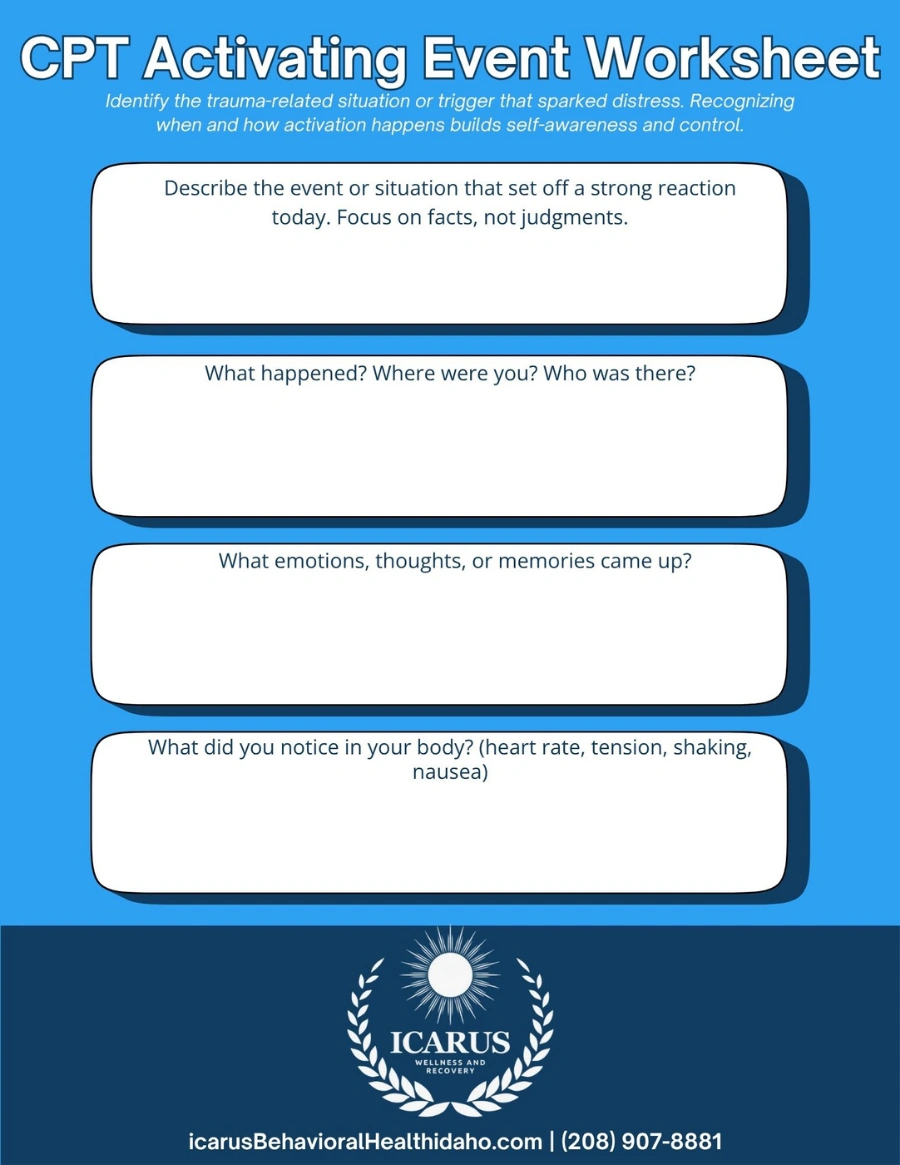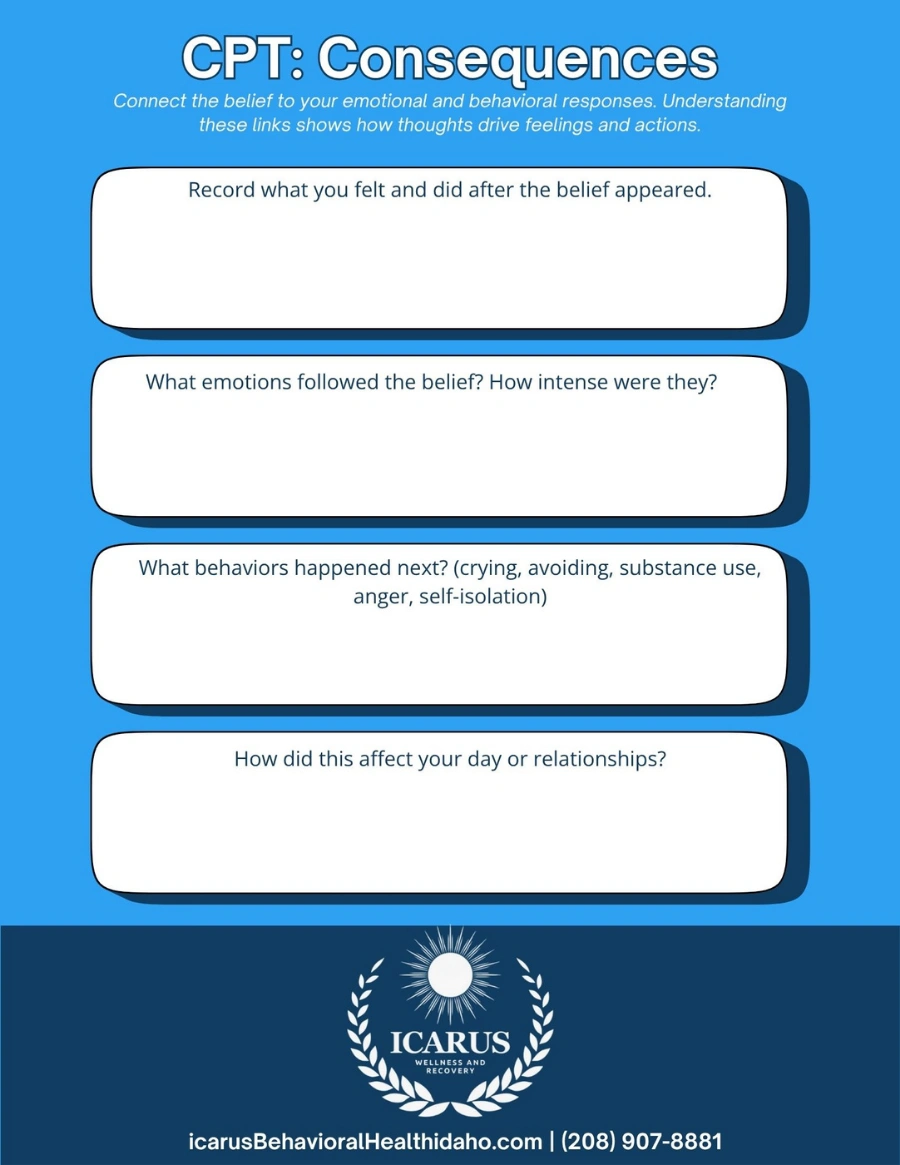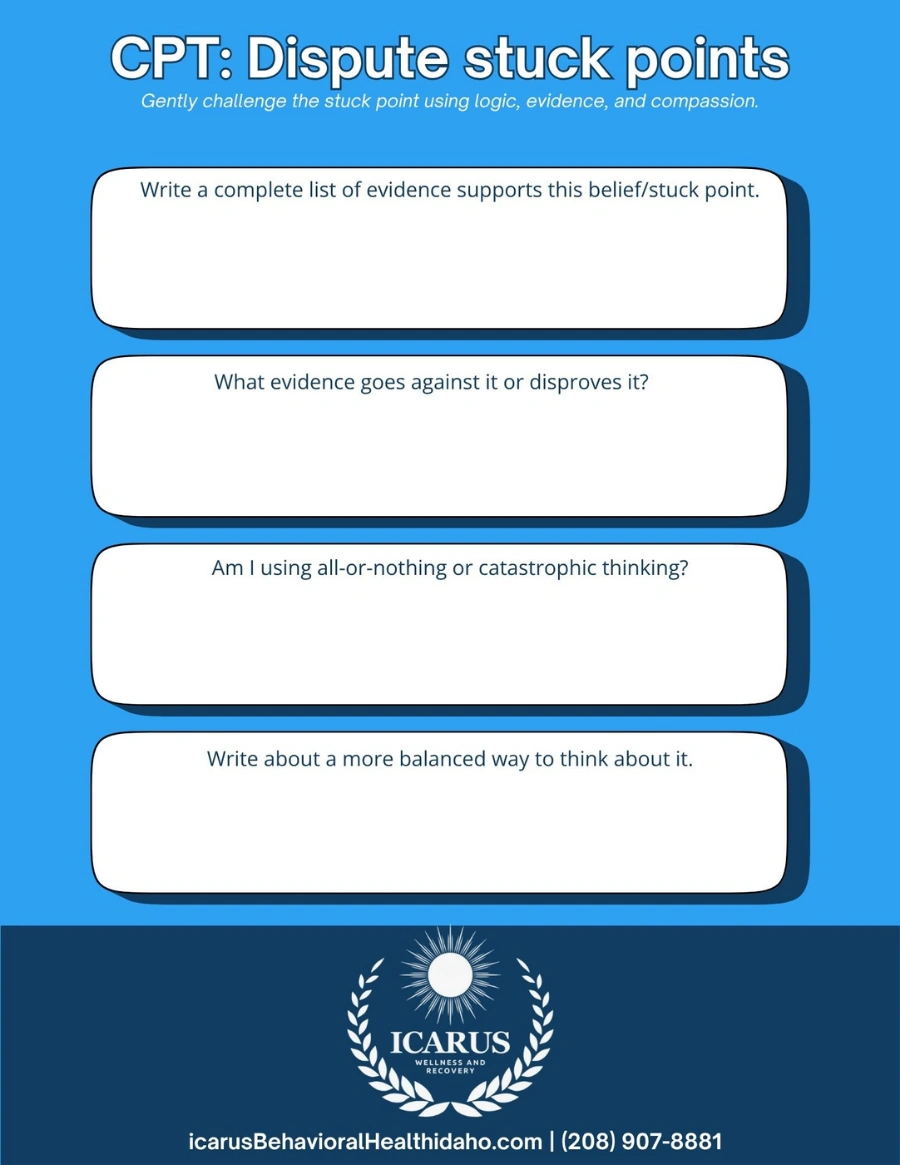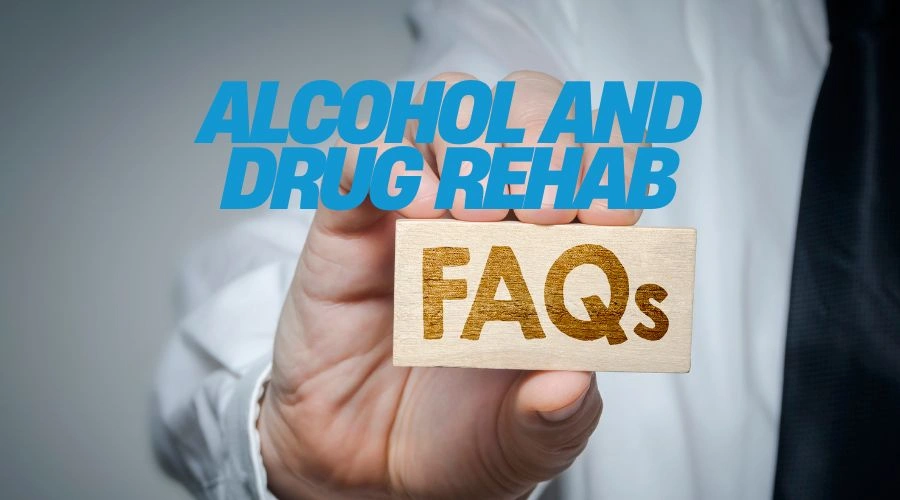CPT Worksheets for PTSD Therapy from Icarus Wellness & Recovery
Healing after experiencing trauma takes time and courage. But it also takes the right tools to support your unique recovery needs. Our Cognitive Processing Therapy worksheets are effective, evidence-based ways of working on improving your post-traumatic stress disorder (PTSD).
Cognitive Processing Therapy (CPT) is a respected method for approaching PTSD and other trauma-related conditions.
At Icarus Wellness & Recovery Idaho, a JCAHO-accredited treatment center based in Boise, our therapists use CPT to help clients understand how their beliefs about a traumatic event can hold them back from healing, even after the moment of danger has long passed.
Please continue reading to find answers to all your questions about how CPT works and how to put it into action in your pursuit of getting clean and sober. Be sure to download your free materials as well.
Get Effective Mental Health Rehab Options at Icarus
Our CPT Worksheets
Developed by Dr. Patricia Resick and her colleagues, Dr. Candice Monson, and Dr. Kathleen Chard, CPT is a highly recommended resource for individuals struggling with PTSD and related depression or substance use. CPT is most effective when trained therapists guide patients in structured sessions.
Cognitive processing therapy follows a system called ABC, or ABCDE, using acronyms to help each person while learning about trauma.
Our free CPT book will guide you as you work hard to change your thoughts about your trauma. However, most people choose to share their work with a licensed clinical therapist or counselor to achieve the best results.
Worksheet A: Activating Event
The first worksheet, A, addresses the activating event. You will mentally review your trauma and pinpoint the precise situation or memory trigger causing your distress. When you focus on the entire order of the event, you’ll learn to isolate the external trigger from the internal reaction.
Recognizing these patterns is an essential first step. You start to regain control over the intrusive memories you feel and spot recurring trauma cues.
Worksheet B: Beliefs (Stuck Points)
The next step, B, asks you to include the automatic negative beliefs (sometimes called stuck points) that happen after the activating event. Examples can include believing: “It was all my fault” or “I am unsafe.”
The goal of writing down this information is to identify rigid, trauma-based beliefs that keep you stuck in one spot. These beliefs feel true, but usually aren’t. Worse, they are unhelpful. Writing them shift your mind from thinking about these items as an idea, not a fact.
Worksheet C: Consequences of Negative Beliefs
The next page deals with C, the consequences of internalizing unhelpful beliefs. In many cases, consequences include emotional or behavioral outcomes. In this sheet, clients think about what they felt and acted after believing the thought.
The consequences sheet shows the connection between the beliefs and the emotional pain or unwanted behaviors. In addition, they gain awareness of the link between internalized feelings and poor mental health.
Worksheet D: Dispute Stuck Points
In the D (Dispute) worksheet, clients challenge the stuck points using reasoning and self-compassion. They evaluate the evidence and facts that support or contradict the belief. In doing this, clients learn how to spot distorted thoughts and start learning to be kind to themselves. The sheet helps them view the activating event and beliefs in a more balanced way.
Worksheet E: Effective New Thoughts
The E (effective new thought) page challenges clients to replace an old, unhelpful belief with a more realistic and compassionate one. When they reframe the thought in a more positive light, they start to feel a sense of trust and empowerment. Jotting down the new thought helps reinforce progress in trauma recovery.
A Note on Finding a Professional to Guide Your Recovery
Our worksheets are not a substitute for a diagnosis or formal therapy. We suggest reaching out to a mental health professional as you work through this process.
If you need a consultation right away, feel free to call the admissions reps at Icarus Wellness & Recovery Idaho – it’s free to call us and always confidential.
Get Accredited Treatment Programs at Icarus
How Therapists at Icarus Wellness Use CPT Worksheets for Trauma Recovery
At our recovery center, we view Cognitive Processing Therapy worksheets as more than just writing exercises. Instead, they are conversation tools that open dialogues between clients and therapists. in each CPT session, your therapist will review your completed worksheets to:
- Identify behavioral patterns
- Better understand your core beliefs
- Open productive discussions
They might also ask you to read aloud what you have written or summarize your thoughts or insights. The process is collaborative, allowing clients to gain a greater understanding of the thoughts that are holding them back.
Therapists use CPT to teach cognitive restructuring skills to clients in real time and to measure progress. Comparing early and later journal sheets reveals to the therapist your beliefs about trauma. They can see you shift from fear or shame to self-trust and balance – almost in real time.
CPT Are Just One Tool in Our Comprehensive Kit
While CPT worksheets are very effective, they’re just one component of trauma-informed care. Besides CPT, clients often experience the following in their treatment plan:
- Mindfulness or meditation: Mindfulness training helps improve focus and reduce anxiety or self-doubt. When clients learn to observe their thoughts and feelings without judgment, they develop the ability to return to a calm foundation when needed.
- Eye Movement Desensitization and Reprocessing (EMDR): EMDR therapists use guided eye movements and bilateral stimulation to help the brain reprocess stressful memories. Clients focus on the traumatic memories while following sensory cues, helping the memories lose their intensity.
- Narrative exposure therapy (NET): The NET treatment method encourages clients to tell the story of their trauma within the safety of a treatment session. As clients piece together the sequence of events, they start integrating memories that used to feel fragmented and see how they fit into their overall trauma.
- Medication management: In the most debilitating trauma cases, clients may require medication to improve sleep or reduce anxiety symptoms, especially if they interfere with therapy. Our licensed clinicians will oversee prescription medications as part of our full continuum of care.
- Peer support groups: Healing sometimes happens in a community setting. Group sessions with peers help build connections with others who understand traumatic experiences.
Our holistic approach to trauma treatment provides lasting results by equipping clients with the tools to manage their trauma after leaving the facility. Our clinical staff and writers have also put together an ever-expanding array of resources and worksheets related to other helpful forms of therapy. You can review this list below:
- Music therapy worksheets
- IFS therapy worksheets
- REBT worksheets
- Recovery journal prompts
- with additional resources published regularly
Call Icarus Idaho for Effective Trauma Recovery
Icarus Wellness & Recovery’s Boise treatment center provides clients with specialized, individualized mental health care. Our PTSD and trauma treatment programs and therapists have extensive knowledge of CPT and other treatments that will facilitate healing after a traumatic event.
It may be helpful to know that we accept private-pay and self-pay clients on a sliding scale as needed, as well as those with group health insurance.
We want to help make therapy as affordable as possible; we can even provide you with a free insurance review to ensure your out-of-pocket fees are as low as they can be.
Don’t let a traumatic event continue to ruin your life. Reclaim your mental well-being by calling Icarus Idaho confidentially today.
Up To 100% of Rehab Costs Covered By Insurance
FAQs on Cognitive Processing Therapy for Addiction and Mental Health
Below is a list of some of the questions new clients often ask about CPT:
Can I watch a video to learn more about CPT?
Yes. Many trauma counselors and mental health professionals have published cognitive processing therapy video demonstrations on the web. Watching short clips can help you visualize how trauma therapists guide clients throughout the ABCDE model.
How does CPT fit into my complete trauma recovery plan?
CPT is part of a larger education-based therapy model. It teaches clients how trauma can harm the brain and lead to negative thought patterns. The worksheets and sessions work together to help you learn how to cope with your traumatic memories.
Can I use CPT worksheets without a counselor?
Yes, but it is not effective. The worksheets are excellent educational tools that help you with self-awareness. However, CPT is a therapist-led program. The counselor or therapist helps you understand your responses, challenges you to dig deeper, and guides you through the healing process. Without that level of professional support, you may get stuck in the process.
Is there an edition of CPT for people with military trauma?
Yes. The CPT for Military program, developed for the United States Department of Veterans Affairs (VA) addresses the often-intense experiences of veterans and active-duty service members. It follows the same ABCDE structure we’ve discussed. However, it includes examples and language that are more relatable to military members, as it draws on combat and deployment experiences.
How can I get ready for my first cognitive processing therapy appointment?
Before meeting with your therapist for the first time, write down the therapy goals you have in mind. It is also helpful to provide the mental health specialist with a list of any challenges you may have with trauma, anxiety, or avoidance behaviors. You can even download our CPT worksheets to give your therapist a snapshot of your current mindset.
How can I tell if CPT will be the right treatment for me?
Do you struggle with residual shame, guilt, or self-blame after a trauma? If yes to any of those, CPT may be a good fit for you. A brief intake session can help confirm whether this evidence-based treatment method is suitable for your individual needs.
How do I keep track of my personal growth while using these worksheets?
Date and keep copies of your completed worksheets. As you continue working through CPT therapy, compare your earliest sheets versus current insights. Your therapist will also provide you with valuable insights and help you make adjustments to make further growth.










